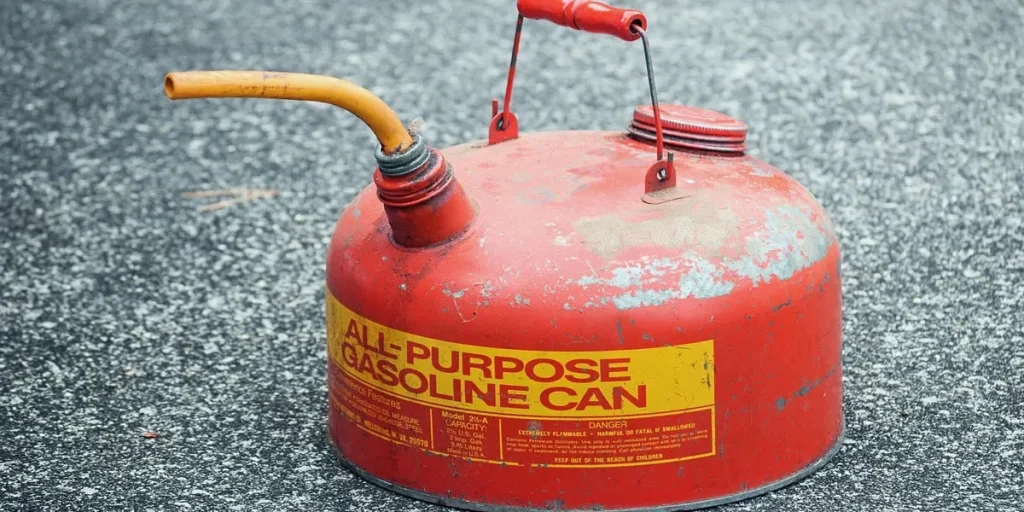Six gallons of gasoline typically weigh approximately 36 to 37.2 pounds. The exact weight can vary based on the gasoline’s temperature and composition.
Navigating the nuances of fuel can be complex, especially when considering the weight of gasoline for transportation or project needs.
Gasoline is a vital fuel used across various sectors, from filling up your car to powering certain engines and generators.
Understanding the weight of this fuel is essential for safe handling and transport. This practical knowledge is particularly relevant for industries that require precise measurements, such as in aviation or shipping logistics.
By considering the volume-to-weight conversion, one can ensure accurate fuel budgeting and compliance with regulations pertaining to the maximum permissible load on vehicles.
With gasoline density averaging around 6 to 6. 2 pounds per gallon, a rough estimate allows for effective planning and efficiency in operations where fuel management is critical.
The Basics Of Gasoline
Gasoline is a fuel commonly used to power vehicles. Its weight can affect your car’s performance and efficiency.
Understanding gasoline’s weight helps in planning and budgeting for travel. Before diving into the specifics of its weight, let’s explore gasoline’s composition and why its weight matters.
Composition Of Gasoline
Gasoline is a mixture of hydrocarbons. It is refined from crude oil. The primary components of gasoline include:
- Paraffins: High energy content, good stability.
- Naphthenes: Provide a balance of properties.
- Olefins: Contribute to octane rating.
- Aromatics: Enhance performance, carry energy.
Additives are also included to improve performance and reduce engine wear. Each element plays a role in the weight of gasoline.
Why Weight Matters?
The weight of gasoline is crucial for several reasons:
- Vehicle Performance: Heavier loads affect acceleration and handling.
- Fuel Economy: Carrying more weight means burning more fuel.
- Transportation and Storage: Knowing the weight aids in logistics.
On average, a gallon of gasoline weighs about 6 to 6.3 pounds. Consequently, 6 gallons would weigh between 36 to 37.8 pounds. This variation depends on temperature and gasoline composition.
Measuring Gasoline

Understanding how to measure gasoline is key when dealing with fuel, whether it’s for your car or managing inventory.
The weight of gasoline is not as straightforward as measuring water or other consistent liquids.
Gasoline’s weight depends on its density, which can vary based on numerous factors such as temperature and composition.
Let’s explore how we can equate the volume of gasoline to its weight.
Volume Vs. Weight
Volume measures how much space gasoline takes up, usually in gallons or liters. Weight, on the other hand, is how heavy the gasoline is, measured in pounds or kilograms. These two measurements are connected, but they’re not the same.
One gallon of gasoline at 60 degrees Fahrenheit doesn’t weigh the same as one gallon of another liquid like milk. The actual weight differs because of the density of the liquid.
Typical Gasoline Density
Density is the mass per unit volume of a substance. For gasoline, it typically ranges between 6.073 to 6.217 pounds per gallon at 60°F.
A precise density figure is essential to convert the volume of gasoline to weight accurately.
| Temperature (°F) | Density (lbs/gallon) | Weight (6 gallons) |
|---|---|---|
| 60 | 6.073 – 6.217 | 36.438 – 37.302 lbs |
To calculate the weight of 6 gallons, you multiply the volume by the density. As the temperature changes, so does the density and therefore the weight.
It’s important to always reference the correct density for accurate weight measurements.
Calculating The Weight
‘Calculating the Weight’ of gasoline is an interesting venture. It’s not just about filling up the tank. It’s also about understanding how much weight you’re adding to your vehicle.
Let’s dive into the math behind this everyday action and explore the factors that can alter the weight of gasoline.
Knowing the weight of 6 gallons of fuel can be particularly useful when managing fuel needs for trips or even when considering vehicle performance and efficiency.
The Math Behind 6 Gallons
One gallon of gasoline typically weighs about 6 to 6.3 pounds, depending on the temperature and composition.
To figure out how much 6 gallons of gas weigh, we’ll use the average weight:
Weight of 1 gallon = 6.3 pounds
Weight of 6 gallons = 6.3 pounds/gallon × 6 gallons
With a simple multiplication, the weight comes out to:
| Number of Gallons | Average Weight per Gallon (pounds) | Total Weight (pounds) |
|---|---|---|
| 6 | 6.3 | 37.8 |
Therefore, 6 gallons of gas weigh approximately 37.8 pounds.
Factors Affecting Gasoline Weight
Several factors can influence the weight of gasoline:
- Temperature: Gasoline expands with heat and contracts with cold. Higher temperatures can decrease the weight of a gallon.
- Composition: The blend of hydrocarbons can contribute to variations in weight. Winter blends are often lighter than summer blends.
- Altitude: At higher altitudes, gasoline weighs less due to lower atmospheric pressure.
Bearing in mind these factors is essential for precise calculations. Your vehicle’s fuel efficiency and how it handles the load depend on the correct estimation of the weight of gasoline carried.
Practical Implications

Understanding how much gas weighs is key in many areas. Knowing the weight of 6 gallons of gas has real-world uses.
Let’s explore the practical implications of this knowledge.
Fuel Transportation
Managing fuel transport involves weight considerations. Heavier loads demand more fuel and have stricter regulations. Here are key points:
- Safety limits: Transport vehicles have weight limits for safe travel.
- Fuel efficiency: More weight means less fuel efficiency.
- Regulatory compliance: Overloading violates transport laws.
Impact On Vehicle Performance
The weight of gasoline can affect how a vehicle handles. Here is a breakdown:
| Aspect | Impact |
|---|---|
| Acceleration | Heavier cars accelerate slower. |
| Braking | Stopping distance increases with weight. |
| Fuel Usage | More gas weight can lead to more fuel use. |
Balance consideration: Drivers need to balance fuel levels for optimal performance.
Variations In Gasoline
Variations in gasoline are not only common but influential in determining how much 6 gallons of gas weigh. Various factors contribute to these changes.
Understanding these factors can help you estimate the weight of gasoline accurately.
Seasonal Changes
Gasoline isn’t immune to seasonal shifts. These changes can affect both its density and weight. During colder months, gas contracts, increasing its density.
In warmer seasons, it expands and becomes less dense. This means that 6 gallons of gas could weigh slightly more in winter than in summer.
Different Grades And Their Weights
Different grades of gasoline exist, each with a unique weight. Premium, mid-grade, and regular fuels don’t weigh the same for a 6-gallon volume.
This is due to varying densities and additive packages.
| Grade | Density (approx.) | Weight per 6 Gallons (approx.) |
|---|---|---|
| Regular | 2.87 lb/gal | 17.22 lbs |
| Mid-Grade | 2.88 lb/gal | 17.28 lbs |
| Premium | 2.89 lb/gal | 17.34 lbs |
The weight of 6 gallons of gas lies between 17 and 18 pounds, usually. However, these numbers shift with season and grade.
Knowing these facts helps you predict the weight of your gasoline accurately.
FAQ the Weight of 6 Gallons of Gasoline
What Is The Weight Of 6 Gallons Of Gasoline?
On average, 6 gallons of regular gasoline weigh about 36 pounds.
This is considering gasoline’s average density of approximately 6. 3 pounds per gallon.
However, gasoline density can vary with temperature and grade.
How To Calculate Gas Weight For Travel?
To calculate gas weight for travel, multiply the number of gallons you will use by gasoline’s average density of 6. 3 pounds.
Ensure to include this in your vehicle’s total weight to stay within safe loading limits.
Does Gasoline Weight Affect Fuel Efficiency?
Yes, the weight of gasoline affects fuel efficiency. Heavier loads require more energy to move, thus reducing the vehicle’s miles per gallon.
Consider this when carrying large amounts of gasoline over long distances.
Can Gas Weight Vary With Temperature?
Gasoline weight can vary with temperature as it expands and contracts with heat and cold.
This can slightly affect the weight per gallon, with colder temperatures increasing density and weight, and higher temperatures decreasing it.
Conclusion
Understanding the weight of gas is crucial for various applications, from transportation to science projects.
Six gallons of gas typically weigh about 36 pounds, considering the average weight of 6 pounds per gallon. This knowledge is essential for safe handling and efficient planning.
Remember, depending on factors like temperature and gas blend, the weight can vary slightly. Stay informed and drive safely!
Resources:
https://www.eia.gov/energyexplained/natural-gas/
https://www.energy.gov/natural-gas
